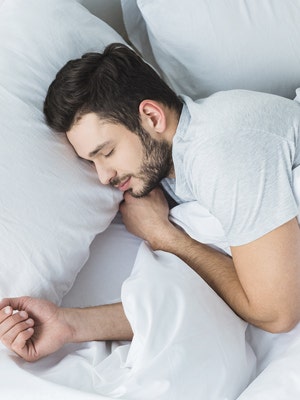Is it really important to get enough sleep to sustain performance?
Sleep is a physiological necessity that contrasts with wakefulness: a momentary suspension of the state of consciousness, essential for the body to recover energy and which involves various components of the nervous system, both central and autonomous.
It's considered an integral part of recovery, but is it really crucial for optimal performance?
The science of sleep
 There is a branch of science, called chronobiology , which studies the biological rhythms of man. Indeed, it has been demonstrated that we have internal hands capable of optimizing the adaptation of the organism according to the time of day. In this way we take rhythms, called circadians, which allow us to increase our efficiency. First of all, these circadian rhythms are controlled by the alternation of light and dark, and they also guide us in falling asleep: when our clock is misaligned with the external environment, as in the case of jet-lag, we are affected in terms of well-being (both physical and mental).
There is a branch of science, called chronobiology , which studies the biological rhythms of man. Indeed, it has been demonstrated that we have internal hands capable of optimizing the adaptation of the organism according to the time of day. In this way we take rhythms, called circadians, which allow us to increase our efficiency. First of all, these circadian rhythms are controlled by the alternation of light and dark, and they also guide us in falling asleep: when our clock is misaligned with the external environment, as in the case of jet-lag, we are affected in terms of well-being (both physical and mental).
It therefore appears that sleep plays an important role in well-being, as well as having an impact on emotional regulation, cognitive performance and quality of life. But how does it impact training and performance? It's definitely an integral part of the process of fitting in between workouts. Several studies have in fact reported that longer sleep duration and better quality in athletes are associated with improved performance and competitive success.
If you are a true athlete, sleep!
Better sleep can reduce the risk of injury and illness by not only optimizing health, but also improving performance through increased participation in workouts. Despite this, athletes often tend to underestimate the importance of good sleep . Tight training schedules, travel and competition trips, stress and overtraining can lead to not getting enough sleep, and athletes demonstrate very little self-evaluation in this respect.
In addition to the aspects related to the frequency of injury, the big risk for the athlete is the development of overtraining syndrome, also known by the term Overtraining .
The results of the performance, in fact, depend in the same way on training (able to induce positive stress for the body), nutrition (which supplies the essential energy substrates for the activity) and rest (moment in which the necessary physiological adjustments take place restoring physical balance).
When everything is in balance, i.e. homeostasis is kept perfect, the results are greater and there is no risk of overtraining. On the other hand, when even just one of these three pillars dominates the others, we risk reducing performance and entering the vicious circle of overtraining.
Overtraining? Better not
But what are the causes in detail that can lead us to overtraining?  Definitely excessive training, too frequent competitions, health problems, unbalanced diet, psychological problems (relational, family, social or work) and insufficient sleep . If we don't rest properly, we can't expect to achieve the best results. The ultimate goal of sleep and recovery is in fact to restore homeostasis in the body: homeostasis which physiologically "breaks down" when we train.
Definitely excessive training, too frequent competitions, health problems, unbalanced diet, psychological problems (relational, family, social or work) and insufficient sleep . If we don't rest properly, we can't expect to achieve the best results. The ultimate goal of sleep and recovery is in fact to restore homeostasis in the body: homeostasis which physiologically "breaks down" when we train.
Very often we focus on the moment of training, leaving out the moment of recovery and forgetting that the improvement of our physical performance depends on rest, especially when it comes to supercompensation .
Supercompensation exists
The physiological response to the disruption of homeostasis by the training stimulus is called supercompensation : in fact, in order not to succumb to the recurrence of a load of the same intensity, the body triggers a process aimed at improving the original performance level. The metabolic reserves, the metabolism and the anatomical structures solicited do not return to the initial state but exceed it to settle at a slightly higher value. But how long do we need to rest for supercompensation to occur? This depends on the type of sport practiced. When training is aerobic or cardio-vascular , an average of 6-8 hours are required. If the activity is of maximal strength, the hours become around 24. In the case of training aimed at hypertrophy or muscle definition , the times are further lengthened, reaching an average of 36 hours.
Sleep determines a large part of our recovery: it is therefore very important not to underestimate this process, and to encourage it both by avoiding disturbing elements (too bright screens, drinking excessive amounts of water, eating, arguing…) and by providing it with elements to induce it. Now let's see how to do it.
Functional nutrition and sleep supplementation
Eating carbohydrates such as pasta or bread at dinner can help sleep : there are several studies showing that an evening meal with a high glycemic index can reduce the time it takes to fall asleep. Several extracts (vegetable and non-vegetable) are also functional for improving the quality and duration of sleep. Primarily Melatonin, but also extracts of Valerian, Passiflora, Chamomile, Melissa, Griffonia and GABA: in different ways these substances regulate our sleep-wake rhythms, stabilizing our circadian rhythms and allowing us to sleep better and longer.
If, on the other hand, we want to support night-time muscle recovery in addition to sleep, we can make use of a natural substance extracted from special cherries: Montmorency black cherries. In fact, the extract of these cherries contains extremely high levels of phytochemicals and phytocomplexes which have an effect not only on oxidative stress and the quality of sleep (they contain good levels of melatonin, the sleep hormone), but also on functional recovery after endurance.
Nutraceuticals and nutrition can therefore, as always, provide us with valid help and at the same time the keys to stabilize our circadian rhythms, allow for good sleep and consequently optimize recovery. All fundamental elements to take our performance to a much higher level.
“ Sometimes, the most urgent and most important thing you can do is get a complete rest . Ashleigh Brilliant" .
Bibliography
Fullagar HH, Skorski S, Duffield R, Hammes D, Coutts AJ, Meyer T. Sleep and athletic performance: the effects of sleep loss on exercise performance, and physiological and cognitive responses to exercise. Sports Med. 2015 Feb;45(2):161-86. doi: 10.1007/s40279-014-0260-0. PMID: 25315456.
Troynikov O, Watson CG, Nawaz N. Sleep environments and sleep physiology: A review. J Therm Biol. 2018 Dec;78:192-203. doi: 10.1016/j.jtherbio.2018.09.012. Epub 2018 Oct 5. PMID: 30509635.
Doherty R, Madigan S, Warrington G, Ellis J. Sleep and Nutrition Interactions: Implications for Athletes. Nutrients. 2019 Apr 11;11(4):822. doi: 10.3390/nu11040822. PMID: 30979048; PMCID: PMC6520871.
Binks H, E Vincent G, Gupta C, Irwin C, Khalesi S. Effects of Diet on Sleep: A Narrative Review. Nutrients. 2020 Mar 27;12(4):936. doi: 10.3390/nu12040936. PMID: 32230944; PMCID: PMC7230229.
Zhao M, Tuo H, Wang S, Zhao L. The Effects of Dietary Nutrition on Sleep and Sleep Disorders. Mediators Inflamm. 2020 Jun 25;2020:3142874. doi: 10.1155/2020/3142874. PMID: 32684833; PMCID: PMC7334763.
Zawilska JB, Skene DJ, Arendt J. Physiology and pharmacology of melatonin in relation to biological rhythms. Pharmacol Rep. 2009 May-Jun;61(3):383-410. doi: 10.1016/s1734-1140(09)70081-7. PMID: 19605939.
Coomans CP, van den Berg SA, Lucassen EA, Houben T, Pronk AC, van der Spek RD, Kalsbeek A, Biermasz NR, Willems van Dijk K, Romijn JA, Meijer JH. The suprachiasmatic nucleus controls circadian energy metabolism and hepatic insulin sensitivity. Diabetes. 2013 Apr;62(4):1102-8. doi: 10.2337/db12-0507. Epub 2012 Dec 28. PMID: 23274903; PMCID: PMC3609590.
Coomans CP, van den Berg SA, Lucassen EA, Houben T, Pronk AC, van der Spek RD, Kalsbeek A, Biermasz NR, Willems van Dijk K, Romijn JA, Meijer JH. The suprachiasmatic nucleus controls circadian energy metabolism and hepatic insulin sensitivity. Diabetes. 2013 Apr;62(4):1102-8. doi: 10.2337/db12-0507. Epub 2012 Dec 28. PMID: 23274903; PMCID: PMC3609590.



Comments
Write a comment about the article